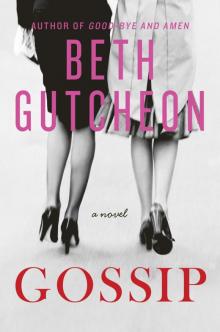- Home
- Beth Gutcheon
Leeway Cottage Page 17
Leeway Cottage Read online
Page 17
Strikes are forbidden.
Giving money or other assistance to strikers is forbidden.
Harassing Danes who cooperate with Germans is forbidden.
Censorship of the press will now be overseen by Germans.
All explosives and firearms must be turned in by September 1.
A special tribunal will be set up to judge and punish any who disobey these regulations.
Carrying arms or contributing to sabotage in any way is to be punished by death.
This is the end. The government refuses to announce these ultimata, and the cabinet resigns. The king applauds.
In the small hours of Sunday morning, in dark and rain, Nina wakes, alone in the apartment, to sounds of weapon fire. Hanneken has begun his assault. Danish military installations all over the country are being seized. Officers and soldiers will be interned; weapons and materiel captured. What Nina hears is the attack on the Royal Navy in Copenhagen Harbor. Admiral Vedel, at the opening shot, has ordered the fleet to make for Sweden, or if unable to escape, to scuttle. By full day, twenty-nine Danish Navy ships have gone to the bottom of the harbor. The rest have crossed the Øresund to Swedish waters.
Dawn finds Wehrmacht soldiers posted outside government buildings everywhere, including the palaces. The king declares himself a prisoner of war, and is henceforth under house arrest.
Werner Best calls for the press and gives a manly speech declaring that “this ridiculous little country has inoculated its people with the idea that Germany is weak…”
In spite of Best’s bluster, it is now General von Hanneken whose state of emergency regulations are posted on Sunday and broadcast throughout the day. There are tears of grief and rage all over the ridiculous little country.
Everyone has felt a crisis coming, felt it must come, thought it should come. But now that it is here, there is a terrible dread. Henrik and Ditte, at their summer cottage in Nyborg, are frightened and anxious and want to be with their children. They spend the day packing, cleaning out the icebox, draining the pipes. There are Wehrmacht soldiers and SS troops seemingly everywhere as they make their way, laden with luggage, onto the ferry and then the train to Copenhagen. It’s a somber journey. They arrive at Central Station at nine-thirty in the evening. There are many other travelers at the station, but the streets outside are weirdly quiet. After a long wait, they secure a ride in a Falck ambulance, sharing it with a young mother and two very tired children who are going in their direction.
Three blocks from the station, two German soldiers stand in the middle of the street holding machine guns across their chests. They signal the driver to the curb.
Inside, Henrik, who is in front with the driver, turns around to give his wife a long look. The young mother, sitting with Ditte, seems to have stopped breathing. One of her children, the boy, raises his eyes, frightened. All these eyes, plus the driver’s, are fixed on the soldier who signals Henrik to roll down his window.
The soldier leans on his folded arms with his head in the window. He takes in each of the passengers in turn, inhaling their fear. Finally he says, in German, “And what do you think you are doing?”
Henrik answers, his German hesitant but his voice steady, “We are going home.”
“You didn’t hear there’s a state of emergency?”
“Yes, but—”
“You thought it didn’t apply to you?”
“We thought we ought to go home.”
“Papers, please.”
Henrik and Ditte hunt for their identity cards. The young mother looks at Ditte, her eyes glassy with panic. The driver sits immobile, hands on the wheel, looking straight ahead.
The soldier looks at the papers Henrik and Ditte give him. He says, “What about you?” to the young woman, who whispers to Ditte, “Jeg taler ikke tysk…”
“And you.” The driver takes his papers from a breast pocket and holds them out without taking his eyes from the street before him.
“It’s after curfew,” says the soldier to Henrik. He has all their papers in his hands.
“We are just trying to get home. We were in Nyborg. You see our address in Copenhagen. Our son and daughter are there alone.”
The soldier has had his fun and it is beginning to repeat itself.
“And you’re all together?”
“Yes,” says Henrik. He doesn’t know what’s going on in the back but his instinct is to keep this simple.
The soldier hands the papers to Henrik. “You need permission to be out after curfew. Don’t do this again.”
“Thank you. We won’t.”
The soldier steps back from the car and says something to his companion. As the driver pulls away from the curb, the soldiers are laughing.
“Oh, my god,” says the young woman. “Oh, my god.”
“Yes,” says Ditte. Henrik had now turned around to them. “You didn’t have your papers?” he asks the young woman.
“She doesn’t speak German,” says Ditte.
But she had understood what was wanted. “I have them,” she says, “but we’re Jewish. I thought they were going to take us.” Her accent is foreign, perhaps Russian.
“Oh, we’re Jewish, too,” said Henrik, although he in fact is not. “We’d have gone together.” Somehow his native amusement has reasserted itself; since danger has passed, maybe there really was none in the first place. It isn’t rational, it’s his relentlessly optimistic temperament.
“Do you have someone waiting for you at home?” Ditte asks kindly. “A husband?”
“No, he is in the north, in Jutland, with the chalutzim. They are training to be farmers in Palestine. Who is it who calls children hostages to fortune?” She is trying not to cry. She puts her nose to the hair of her sleeping baby daughter and breathes as if praying.
“Shakespeare,” says Ditte.
“Not Shakespeare,” says Henrik. “Someone else. Raleigh? Bacon?”
“I’d go to Sweden tonight if I could…” says the miserable young mother. It’s as if she suddenly believes that Ditte and Henrik will tell her how.
All this time, in spite of their fear, they have kept their voices level enough that they haven’t alarmed the children. The little girl hasn’t even wakened. The driver stops before the young woman’s apartment building. Henrik gets out to see her to her door, but she says they must go on; they might be stopped again. Henrik shakes her hand and wishes her Godspeed, and they watch, with the driver, until she is inside the building.
Alone now with the driver, Henrik and Ditte are silent as they drive on through the long summer twilight. They would go to Sweden themselves tonight if they could. But Sweden would send them back. It has been tried. They feel as if they are in the bottom of a deep dark pocket, and the malignant giant from whose belt they swing is about to get to his feet and saunter off with them.
In Dundee that Sunday, Gladdy woke up from a long afternoon nap, thoroughly confused to be in her childhood bedroom at Leeway. She lay under her soft cotton comforter and breathed in the smells of the house, as she gradually adjusted to being not a child, but a wife, and six months pregnant, and alone.
She rolled onto her side and looked at the armchair in the corner as she let go of the last wisps of whatever she had been dreaming. The chair had a blue slipcover showing scenes from Robinson Crusoe; she remembered her mother sewing it. The chair had been in Tommy’s room, but Gladdy liked it so much that the summer she was ten he gave it to her for her birthday. Tommy was at sea, and hadn’t been heard from in weeks. Neville was in the Pacific, too, but she’d had a night letter from him only two days ago.
She felt the baby kick.
The house seemed utterly quiet. It was midafternoon; she’d slept a long time. The August sun was golden, filtered through the leaves of the giant oak tree whose branches stretched almost to her window. Sandra and baby Eleanor were most likely down at the bathing beach. Sydney had said at lunch that she and some friend from the knitting group were going to take their scarves and socks into th
e village to Dot Sylvester, who was in charge of sorting and packing them and taking them over to Union to the train. Was that what she said? Or had she said she was going to play golf? The house ticked quietly, as it had in her earliest childhood. The safest coziest place in the world, this house, with its musty summer-house smells.
The Robinson Crusoe chair reminded her of a blue lambswool blanket with a satin binding she had loved as a child, trailing around with it, rubbing the binding until it was tattered. Later it hung over the back of her mother’s chaise longue in her bedroom. It was a crib blanket but Molly had kept it near her long after Tom and Gladdy had outgrown it, to remember the days of baby powder and midnight feedings, and sweet-smelling toddlers fresh from their baths. She would rub little pink dancing Gladdy dry before the bedroom heater and then wrap her in the blue blanket and tell her to run quick to get her jammies, and then back quick for a story. Where was it now, that blanket?
Gladdy got up and went into the bathroom between her room and Tommy’s. It had a pedestal sink, with a rust stain from where the faucet dripped, and a flush with the water tank well above the commode, and a chain, a pull-and-pray. There was a stall shower, rather than a tub, which is why they had bathed in their parents’ bathroom when they were small. When she had washed her face and put herself to rights, she went out to the back hall to look in the linen closet.
There were many towels and facecloths, mostly with ragged edges and her mother’s monogram, and some blankets she remembered from sleepaway camp. But the blue blanket wasn’t there. It must be in the window seat in her mother’s room. She would love to have it to wrap her own baby in.
She crossed the silent hallway and opened the door to the big bedroom. Two figures, dark against the bright window, jumped apart as she stepped in, and three people began talking at once.
“Oh, my word, I’m so sorry,” said Gladdy.
“Uh, oh, oh!” said Sydney. “You scared me! You’re awake, darling, I was just going to knock on your door to be sure you—”
“I was just showing Sydney—” said Anselma.
Then they all fell silent.
Then Sydney and Gladys spoke again at the same time: “Did you—”
“I should have—”
Finally Sydney said, “Did you have a good nap? We were trying to be so quiet…”
By now Anselma was over by the chaise, studying something out the window.
“Yes, a lovely nap,” said Gladdy with brainless enthusiasm. “Thank you so much. I sleep better here than anywhere in the world.”
“I’m so glad,” said Sydney. “Well, we had a great adventure downtown, we …Would you like some iced tea? I would!”
“Yes, I’d love some!”
“Anselma?”
“Yes, thanks. That sounds fine.” And the three of them went downstairs to the kitchen, talking slightly frantically. By the time Gladdy remembered she wanted to look for the blanket, she was on the train back to Philadelphia.
Nine days after the fall of the Danish government, on September 8, Werner Best telegraphs Berlin that he would like ships and troops and Gestapo details as soon as possible; that the convenient state of emergency in Denmark presents an ideal time to solve the Danes’ Jewish Problem.
In London, at Churchill’s Special Operations Executive, there is fierce satisfaction in September of 1943. Finally Denmark is boiling. Now the illusion of neutrality is behind them. This is good. At least, according to the Resistance.
For Laurus things are both better and worse.
For two years he has translated news for the underground presses, communiqués from SOE to the Resistance cells, instructions for handling bombs and weapons. He has helped with strategies, geography, and contacts; he has friends all over the country, musicians he has played with, friends he has made on tour. He knows a great deal about storage in various auditoriums and concert halls; he knows who has access to the stage doors and loading docks, places where caches of arms and explosives can be moved in and out undetected along with a grand piano or a set of drums. He knows also that Nina, his adored little sister, has been working for the student underground for a year.
The awkwardness is this. Laurus knows that if the Germans decide to move against the Danish Jews, the organized Resistance (stronger every week) is under orders to stay out of it. It is essential that the Resistance not draw down vengeance on the Jews, and similarly essential that protecting the Jews not endanger the work of the Resistance, compromising the intelligence and escape routes they need for their own work. If the worst happens, Laurus won’t be able to lift a finger to protect his family.
Just after Labor Day in 1943, Bernard Christie underwent hemorrhoid surgery at the Cleveland Clinic. Most of the young doctors had gone to war, and the surgery was done by gentle old Dr. Southworth, who had come out of retirement to fill in. This was probably a mistake. Like many men of his generation he enjoyed his cocktails, and like many doctors he enjoyed his access to the medicine cabinet. More so lately, since there was no reason not to enjoy a soothing buzz in the sunshine as well as by lamplight, when all he was likely to cut was deadheads from the roses. Bernard’s surgery was not complex but there are always ways for such things to go wrong and this one did. The patient failed to thrive, complained a great deal, and refused to sit up even on his rubber doughnut, even after the hospital said he could go home. At home, he was eventually found by Maudie unconscious on his bed of pain in a pool of fresh blood. His face was a greenish color and even his gums were white. He was rushed back to the hospital in an ambulance where he had many transfusions and the chief of surgery had to be called in to sew him a new anal orifice.
Candace’s difficulties in explaining all this to Sydney on the phone were epic. It was a minefield of forbidden images and vocabulary, and yet she was alone in a big house with her husband in pain and possibly dying, and she didn’t know what was going to happen and she wanted her daughter with her, she really did. Brash noisy Sydney, brimming with health and confidence these days, was just what she wanted. Or thought she wanted.
On her end of the phone, in her apartment in New York, Sydney heard something in Candace’s voice that was new, and it touched her. Her mother was getting old. Her mother was looking into a future in which frightening and disgusting things could happen that she was helpless to intimidate or banish.
“Would you like us to come out for a day or two?” she astonished herself by asking.
“Well…yes, dear, I really would. If you thought you could do that.”
Sydney packed up her own clothes, and the baby’s diapers and equipment, and with a fair mountain of luggage, she took a taxi to Grand Central Station and boarded the overnight train for Cleveland. (IS THIS TRIP NECESSARY? asked signs from the station walls.) Travel was terrible these days, with trains crowded with soldiers and constantly sidetracked to make way for other trains on war business. With that on their minds, both Sydney and Candace had forgotten for the moment that her mother didn’t really like small children.
What Sydney never forgot was that to walk into her mother’s house, to have the smell of it swamping her senses as she stepped into the front hall, lily of the valley perfume, furniture polish, her mother’s cigarettes, was to be assaulted with a densely layered reexperience of misery that she feared as others fear physical pain. But here it came. She was her father’s daughter, and a soldier’s wife, and it was the right thing to do and she was on her way to do it.
On September 17, 1943, as Bernard Christie is nearly bleeding to death in Cleveland, Nils Svenningsen, director of the Danish Foreign Ministry (or who would have been if there were still a legal Danish government), goes to see Werner Best in Dagmarhus. He is kept waiting, but only briefly. The plenipotentiary greets him politely and offers him tea.
“It’s real,” Best says proudly, of the tea.
Svenningsen declines. “Your people have broken into the offices of a Danish social organization and stolen files,” he says.
“Really?” Dr. B
est is, rather fussily, warming his teapot with boiling water and measuring out his precious oolong.
“The Jewish Community Center. They made a mess and took away lists of the members’ names and addresses.”
“I believe I heard about that.”
“They were heard speaking German and seen leaving the premises.”
“Not in uniform, were they?” asks Best. He carries the tea tray to his desk and sits down. To Svenningsen the tea smells of culture, of ancient civility, of parties his piano teacher gave after recitals when Svenningsen was small, with pitchers of thick cream and pastries piled on plates. Best does not repeat his offer to share it.
“Not in uniform, no, but they certainly were German soldiers.”
“Well, they’re far from home. They get up to things when they’re off duty. I wouldn’t say it meant anything.”
Werner Best looks calmly at Svenningsen over the rim of his teacup. Svenningsen stares at him. “This is not the start of an action against Danish Jews?”
“I assure you, it is not. There are no plans for any such action.”
Nina knocks on the door of a house near Marmorkirken. She is still tan from summer sun and her hair has streaks that are almost white. A girl she knows from school opens the door and smiles her in. When the street door closes behind them, they hurry through the parlor to the kitchen, and down the cellar stairs.
In the basement, by the light of a bare bulb, a young man types a mimeo stencil on a portable typewriter, a rare object these days. Three young women are collating pages while a boy runs the mimeo machine. There is a Webly pistol lying on a shelf above him; the mimeo boy is also the guard.
Their paper is hardly more than a flyer but it has a wide readership; nobody knows how many because each copy is passed from hand to hand. The paper changes locations every week or so. Free Denmark, a monthly with a much bigger circulation, is being composed at present in a dental clinic, where trays of type are concealed by day in the medical cabinets and can be hidden at a moment’s notice. Some mornings the dentist and his assistant have to clear cigar ash off the spit basin and check the tray of dental tools for wayward type slugs.

 The Affliction
The Affliction Dead at Breakfast
Dead at Breakfast Good-bye and Amen
Good-bye and Amen Leeway Cottage
Leeway Cottage Gossip
Gossip Saying Grace
Saying Grace